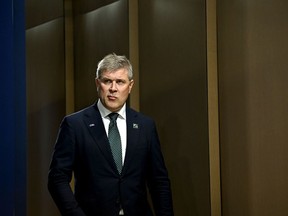Iceland’s Prime Minister Bjarne Benediktsson has dissolved his coalition government and called snap elections on the North Atlantic island in late November.

Article content
(Bloomberg) — Icelandic Prime Minister Bjarne Benediktsson has dissolved his coalition government and called snap elections on the North Atlantic island in late November.
Benediktsson told reporters on Sunday afternoon in Reykjavik that the move comes in the wake of discontent that has been building for some time. He plans to visit President Halla Tomasdottir on Monday and ask her to dissolve parliament.
Advertisement 2
This ad has not loaded yet, but your article continues below.
Article content
“As the fall came, increasing disagreement between the coalition parties began to emerge,” he said, citing asylum seekers and energy policy as some areas of disagreement. “My conclusion is that there is no prospect of reaching a conclusion on these key issues.”
An early general election could lead to a shift in power in the Nordic country, where the opposition Social Democratic Party and the Center Party are currently leading in opinion polls. The last time the Social Democrats were part of a ruling coalition was more than a decade ago following the banking collapse in Iceland that coincided with the global financial crisis.
The government’s conflicts come against the backdrop of recurring volcanic eruptions in the country’s southwestern peninsula. In addition to the ministers’ attention, the seismic activity has led to the need to rebuild infrastructure and rehouse about 1% of the country’s population.
The tourism-dependent island also faces persistent inflation and interest rates at the highest level in Western Europe. This month, the central bank reduced borrowing costs by a quarter of a percentage point to 9.0%.
Article content
Advertisement 3
This ad has not loaded yet, but your article continues below.
Article content
John Bjarke Bentsson, chief economist at Islands Banki HF, expects the cuts to continue into November even though the general election is likely to be held soon after the decision. However, he said the central bank “may be more cautious about taking big steps.”
Benediktsson’s centre-right Independence Party, along with the left-wing Green Party and the centrist Progressive Party, have governed since 2017. The prime minister only took office in April when his predecessor, Katrin Jakobsdottir, decided to run for president in the June election, where she came in second place.
Benediktsson’s party has lost support in recent months, finishing third in opinion polls, while support for the left-wing Green Party of about 4% makes it the least popular of the eight groups represented in parliament.
However, voters tend to “go home” and ruling parties are likely to do better than polls suggest, says Erikor Bergmann, professor of politics at Bifrost University. He pointed out that the Progressive Party is the most likely to join any future coalition, given its location in the middle of the political spectrum, which makes it easy for them to make deals in all directions.
Advertisement 4
This ad has not loaded yet, but your article continues below.
Article content
Benediktsson said that the elections should take place no later than 45 days after the dissolution of Parliament. Iceland was due to hold its next general election by September 2025, although the left-wing Green Party had been calling for the vote to be held in the spring.
The election also cast doubt on Iceland’s 2025 budget, said Gylfi Magnusson, an economics professor at the University of Iceland and a former economy minister who is not affiliated with any party.
“The most urgent matter on the political scene now is next year’s budget bill,” Magnusson said by phone. “Although it was presented” to Parliament, “it cannot be said how important it will be when it is clear that a new government may take power before the end of the year.”
One of the key items in the budget is the potential sale of Islands Bank shares, scheduled to take place in two stages late this year and next year.
Two terms
The coalition’s first term culminated in the COVID-19 pandemic, and voters rewarded crisis management by renewing their mandate in 2021. Since then, tensions have mounted over migration policy, energy generation and fisheries.
Advertisement 5
This ad has not loaded yet, but your article continues below.
Article content
One matter that caused significant pressure on the Cabinet was the surprise ban on whaling in 2023, imposed by Svandis Svavarsdóttir, who was then Minister of Food and Fisheries. The ban, which caught other parties by surprise, was later found to be disproportionate and lacked a legal basis. Whaling continues under current laws.
Svavarsdóttir, the current infrastructure minister, was elected last week as leader of the Green Left movement, Jakobsdóttir’s political home.
Asylum policy has also proven difficult for coalition partners to agree on. The Prime Minister’s Istiqlal Party wants to take a tougher stance, while the left-wing Green Party intervened in the deportation of a family whose request was rejected. Regarding energy, the environmental movement opposes the Istiqlal Party’s plans to build more power plants.
-With assistance from Philippe Tapwas.
(Updates with comments from economist and political scientist, from paragraph 7)
Article content
